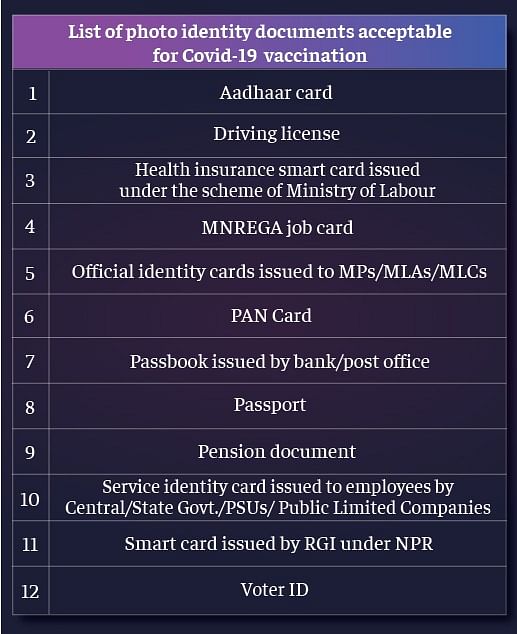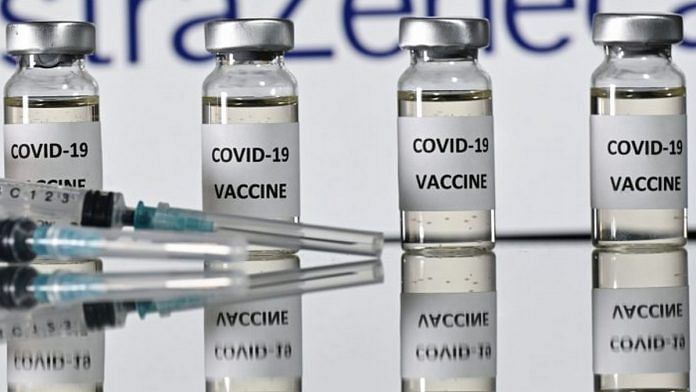New Delhi: Five-member vaccination teams, internet-enabled and mobile sites, and elaborate arrangements to monitor adverse events after vaccination will be the bulwark of India’s Covid-19 vaccination programme.
According to guidelines issued by the central government last week, states have been asked to ensure that one district gets vaccines from only one manufacturer, to avoid “mixing”.
The document, a copy of which has been accessed by ThePrint, highlights that the first priority for vaccination will be given to four groups — healthcare workers, frontline workers, people aged above 50 years and those of any age with comorbidities such as diabetes, hypertension, lung diseases and others.
The latest electoral rolls will be used to identify the people aged 50.
Furthermore, 12 photo-identity documents, such as the Aadhaar, pension cards and bank documents will be used for beneficiary identification.
The guidelines, titled ‘Covid19 Vaccines Operational Guidelines’, also note that it is possible that vaccine vials come without a date of expiry but that should not deter officials from administering the product. All open vials are also directed to be discarded at the end of each session.
Also read: No pressure on drug regulator to approve Covid vaccines, says NITI Aayog member VK Paul
‘Strict vigilance’ against theft
The central government also advises “strict vigilance” against pilferage and theft, given the high demand and low supply of Covid vaccines.
“Stringent vigilance mechanism must be in place to protect pilferage and theft. Any such activity should be immediately reported, and prompt police action should be initiated with clear accountability,” reads the document.
The vaccine efforts will be coordinated by 20 ministries — including the Ministry of Sports, Home Affairs, Railways, Minority Affairs, Housing, Defence, Power, Labour and Women and Child Development — under the aegis of the National Expert Group on Vaccine Administration for COVID-19 (NEGVAC), which is chaired by Niti Aayog member (health) Dr V.K. Paul.
The role of each ministry and development partners such as the World Health Organization (WHO), UNICEF and others, have also been clearly defined.
“While most of the healthcare and frontline workers would be vaccinated at fixed
session sites, vaccination of other high-risk populations may require outreach
session sites, and mobile sites/teams,” the document notes.
Each team will comprise five officers — a doctor/staff nurse/pharmacist/anyone legally authorised to administer an injection, an official from the police, home guard or civil defence to check the registration status of the beneficiary, another officer to authenticate or verify documents and two other officers to provide support and help in awareness generation.
Also read: Officials told to gear up infrastructure, systems for Covid vaccine rollout by 25 Dec
Each session to cover 100-200 beneficiaries
Depending on the availability of space and personnel, about 100-200 beneficiaries will be covered in each vaccination session, which will last nine hours — from 9 am to 5pm.
A lot of emphasis has been placed to ensure that vaccination sessions are planned in such a way that there is no wastage of vaccines. Beneficiaries will be staggered to avoid overcrowding and following the election model, each site will get three lists of beneficiaries that are to be inoculated at the site.
There will also be no spot registration while pre-registration will happen by bulk upload of healthcare workers’ data by respective departments as well as the latest electoral rolls.
“Each vaccination session will be expected to cater to maximum 100 beneficiaries (based on vaccine presentation), however in case of remote and sparsely populated areas the state could organize session for lesser number of beneficiaries ensuring that there is no vaccine wastage. If the number of beneficiaries at a session are less, then such session site will be clubbed with other sessions,” the guidelines note.
They add: “If the session site has adequate logistics and space available for waiting room and observation room along with arrangement for crowd management, one more vaccinator officer can be added to create a session for 200 beneficiaries. A full team of a Vaccinator Officer and four Vaccination officers needs to be deployed if a session is expected to cater to more than 200 beneficiaries.”
Furthermore, the document mentions that each site should be akin to an election booth with precisely defined roles for each team member, internet connectivity and ease of access of the elderly should be kept in mind while choosing it.
At each vaccination centre there will be a Waiting Room, a Vaccination Room and an Observation Room to watch vaccinated people for adverse events before they are allowed to leave.
A digitised platform, the COVID Vaccine Intelligence Network (Co-WIN) system, will be used to track the enlisted beneficiaries and vaccines in real time.
The importance of maintaining “do gaz ki doori” (2 feet distance) at all times has also been emphasised throughout the document.

Also read: Expert panel seeks additional data on Covid vaccines from Serum Institute, Bharat Biotech
Training of private providers
An important principle of the Covid vaccination programme is to ensure that routine immunisation is not disrupted.
To this end, the private sector will be roped in. The guidelines state that the listing of potential vaccinators from private health facilities needs to be completed on time to ensure that they participate in the vaccinator training, which will be organised at the district or block levels.
They can also be engaged as master trainers and be included in vaccination teams especially in sites where more than 100 people are to be vaccinated. States have been advised to build screening mechanisms to ensure that the vaccinators engaged from the private sector are qualified and competent.
If private sites are used for vaccination, they will have to be linked to the Co-WIN platform.
“With the cohort of beneficiaries increasing, multiple private facilities might need to function as vaccination sites. One facility can be identified as a nodal facility, where the HCWs from the nearby facilities can be mobilized to come for vaccination. it should be ensured that the beneficiary load is enough at a vaccination site so that there is minimal wastage of vaccines and resources including human resources,” the guidelines note.
Also read: Approval, pricing, distribution — 5 questions India faces before rolling out Covid vaccine




Each and every person must be tested for positivity. Sero positive persons do not need vaccination. Our need for vaccine doses will therefore be reduced by one half.